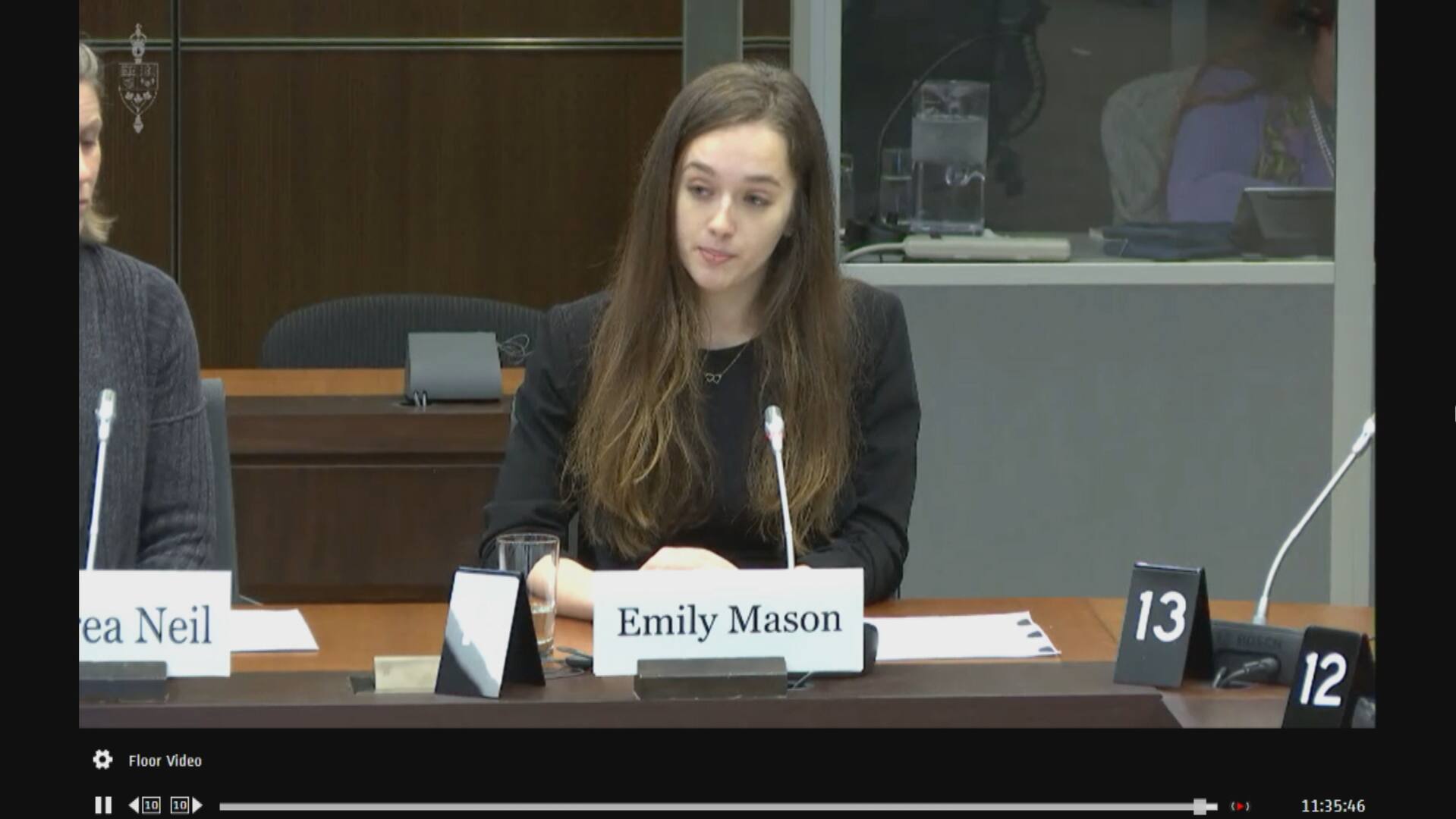Former wrestler ‘shocked’ by disciplinary decision after filing complaint against coach

Warning: This story contains a description of sexual assault.
A former provincial championship wrestler who came forward alleging that her coach sexually assaulted her at a party as a teenager has expressed disappointment over what she describes as the “ridiculous” Canadian complaint process, fearing for the safety of other young wrestlers. athletes.
Madison Payette, now 26, learned last month that her longtime coach, Aso Palani, had been suspended after a disciplinary panel found he assaulted her when she was 17.
The coach was suspended for three years, half of which has already passed – meaning he will be free to work with the youth again in February 2025.
“It’s ridiculous,” Payette said in an exclusive interview with CBC.
“You’re going to say it happened, based on probability…but you’re only going to give him three years? And you’re going to let him go voluntarily and keep working with minors?
“It’s absolutely shocking.”
Palani, 36, “vehemently” denied the assault allegation at the hearing. He did not respond to requests for an interview and plans to appeal the decision.
Despite the panel finding in her favor, Payette says her case highlights the debilitating reality of the patchwork of sports disciplinary processes in Canada, which remains inconsistent across the country despite public discourse calling for improvements for years .
Despite all the talk about safety in sports, Payette says, the reality behind the scenes is still much more difficult for athletes stepping forward.
Wrestling Canada added Palani’s name to a list of suspended coaches in March 2022, but the full decision of the BC Wrestling Association – which explained the reason for his suspension – was not made public for seven weeks, despite repeated requests from the legal team of Payette.
The decision was posted online Tuesday, the day after CBC News contacted Wrestling Canada to request an interview.
In a statement, the national organization said “no decision has ever been made not to publish full details of the suspension”.
Decision describes night of celebration
Payette started wrestling as a high school student in her hometown of Edmonton. Under the guidance of her father, she went on to compete provincially and nationally, as well as for the University of Alberta.
She met Palani when he started coaching three days a week at the Edmonton Wrestling Club in 2012. Palani was also a member of the Canadian national team at the time and enrolled in a wrestling club in BC.
Payette claimed that Palani used his reputation to gain her trust.
“He gave me all the attention a 17-year-old girl could have wanted. He told me I was special. He told me I was mature for my age…you want to believe all these things.”
Payette went to a house party hosted by college athletes in Edmonton in December 2013, a few weeks after her 17th birthday. She said Palani also went to the party, which she called “unusual” for a coach.
According to the disciplinary decision, the rest of the group left to go to a nearby bar. Payette, who was still a minor, stayed behind with Palani.
Payette told the disciplinary panel that Palani gave her alcohol, led her to a bedroom, took off all of her clothes, and forced her to perform oral sex on him.
She said the attack stopped when two college athletes, both men, returned early from the bar.
“I was 17 years old. I really had no dating experience whatsoever. I didn’t know how relationships were supposed to work. And then you have this adult who’s been put on a pedestal, basically, you know, he’s your head coach. He is a member of the national team,” said Payette.
At the disciplinary hearing, Palani said he did not attend the party in question and had no contact with Payette that night. He denied flirting with Payette during his time as her coach.
Palani did not respond to repeated requests for comment from CBC.

Edmonton Police confirmed they had received a complaint from Payette, but said the file is currently closed. Palani has not been prosecuted in this case.
In its decision, the disciplinary panel criticized what it described as Palani’s attempts to attack Payette’s character and credibility “on multiple fronts” during the hearing. According to the decision, the coach and his lawyer questioned her sanity and whether she was too drunk to remember what happened.
Palani also suggested that “girls who cry on the witness stand are unreliable,” according to the decision.
No policy available
Payette decided to file a complaint nine years after the party, spurred on by what she described as a sense of moral responsibility from her work as a high school teacher and all the talk about safe sports in Canada.
Payette said she found wrestling’s governing bodies were unwilling to file her complaint.
“Nobody knew how to handle it. They still don’t know how to handle it. It’s kind of shocking. If I’m being honest… it’s honestly scary,” she said.
“As an athlete, I shouldn’t be asking people how to access these resources… It should be drilled into me.”
Payette ran into a common problem in Canadian sports: where jurisdiction and responsibilities lie.

She first filed her complaint with Wrestling Canada in January 2022, but officials decided the matter was not within their jurisdiction, despite Palani being on the national team. The Alberta wrestling association did not address the complaint, although Payette believed they would, as Alberta was where she and Palani trained and where the party took place.
After three months of back and forth, governing bodies decided that the BC Wrestling Association (BCWA) would investigate Payette’s complaint, as Palani was registered with the club in Burnaby, BC at the time of the party.
The hearing finally took place in April – nearly a year and a half after Payette first came forward.
“The hardest part was the waiting,” Payette said.
BCWA did not have a code of conduct or discipline and complaints policy in place when Payette’s complaint was received.
In a statement, the organization said it had “recently updated” its procedures and provided a link to a disciplinary and complaints policy dated June 1 – several weeks after Payette’s case was concluded.
That policy said sexual assault of a minor that goes further now “carries a presumptive sanction of permanent disfellowshipping.”
“We believe we have a duty to ensure that all athletes have a safe environment in which to compete, and we are committed to improving all existing safe sport initiatives,” a spokesperson wrote in an email.
Athlete expected a lifetime suspension
After the hearing, Payette said she felt several aspects of the process went well: BCWA chose an outside panel, which panelists believed her story, and they recognized how deeply abuse can affect young athletes.
“Finally, this panel of people, they understood me,” she said.
But when she read the decision, she realized that Palani would not be banned permanently.
“Then you come to the end [of the ruling] where they gave their decision and it was pure shock on my face.
“I can’t even describe the emotion. My stomach collapsed at that moment. It felt like everything was for nothing.”
Payette said she expected a lifetime ban given state guidelines on the matter.
In Canada, the Universal Code of Conduct (UCCMS) sets rules for federally funded sports organizations. According to that code, any abuse of a minor should result in “a presumed sanction of permanent disqualification” for the perpetrator.
Speaking to a parliamentary committee focused on safe sport in Canada, Emily Mason, founder of Fencing for Change Canada, discusses the “culture of toxicity, bullying and abuse pervasive in Canadian fencing.”
But since BCWA doesn’t receive federal funding, it doesn’t have to follow the code. The decision did not explain the panel’s rationale for the three-year term.
In its statement, BCWA said it could not comment on the sentence because the panel and its members were “entirely independent” of the organization.
Palani owns a wrestling school that no longer has a secondary school in Surrey. His lawyers confirmed at the hearing that he had trained athletes but had not engaged in any wrestling-related activities during his suspension.
“My question was how many people would have to be sexually assaulted to get him suspended for life,” Payette said.
Local versus federal level
While Palani has never faced criminal charges, the case points to an ongoing CBC News and Sports research that has revealed that nearly 300 coaches—mostly at the local level—have had criminal convictions between 1998 and 2022 for a sex offense against a minor in their care, across multiple sports, counties and jurisdictions.
While the majority of violations occur at the local level, the most recent government action in this area has been in Ottawa.
Last year, the federal government committed $16 million to the Office of the Commissioner for Sport Integrity (OSIC), an independent agency that administers the UCCMS and is responsible for investigating athlete complaints in Canada. The government said federally funded sports organizations that failed to sign up in April risk losing their funding.
Wrestling Canada signed on deadline.
At the provincial and territorial levels, governments have been given until the end of the year to join OSIC or establish their own independent bodies to properly investigate complaints of misconduct.
Ottawa has not yet said what could happen if that deadline is not met.
Despite her experience, Payette felt it was right to come forward
“If BC Wrestling isn’t going to protect me, if Wrestling Canada isn’t going to protect their athletes, then I’m going to do everything I can to make sure everyone is on the alert and no one is letting their kids or themselves down.” in a situation like I was with him,” she said.
“It’s my responsibility.”
More to this story? Send tips to Lori.Ward@cbc.ca.





